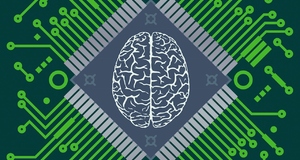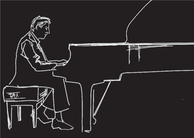Artificial Composers: Tools of the Modern Musician or Affront to Human Creativity?
By
2015, Vol. 7 No. 03 | pg. 2/2 | « Melomics: Melodic GenomicsIt’s clear that EMI and Emily Howell’s algorithms lead them to function as music technology, but other artificial composers operate on different algorithms. Melomics is a newer compositional computer algorithm developed by a team in the University of Málaga in Spain that uses an approach based around biological evolution. According to Melomics collaborator Gustavo Diaz-Jerez (2011), Melomics (a name formulated with the -omics suffix, as in genomics or proteomics) takes the melody as its main object of study. Mimicking biology, the technology developed by Melomics implements a simulated evolution of music compositions. The interaction with professional composers, which can score the compositions on a web interface, provides the "environment" within which the works must fit. Natural selection, as the main force in evolutionary processes, shapes the musical structure of the scores toward more sophisticated and complex compositions. (p. 14) In short, the artificial composer learns more like a human composer does. It is taught the rules of composition: like the fact that certain instruments have physical constraints—piano chords of six notes cannot be played with one hand, for example—or that certain polyphonic combinations fit in a given style while others don’t (Sánchez Quintana, Moreno Arcas, Albarracín Molina, Fernández Rodríguez, & Vico, 2013, p. 102). According to Sánchez Quintana et al. (2013), “nearly a thousand rules have been coded to define the environment in which correct music is intended to evolve” (p. 102). Unlike Cope’s algorithms, Melomics is not dependent on the musical contributions of other artists, which can allow Melomics composers to create unique work of any genre—assuming the system is programmed with enough knowledge to accommodate the genre (Smith, 2013)—and to do so without relying on human interaction.Iamus and Melomics 109: Meta Steps In Music TechnologyThere are two artificial composers that use Melomics: Iamus and Melomics109. Iamus, named for the Greek god who could speak in the language of the birds, was activated in September 2010 and currently composes modernist classical music. As per the Melomics algorithm, Iamus takes a self-generated piece of music and mutates it, checking to see how the mutations conform to its prescribed rules. The best products are allowed to mutate further and further, allowing the most fit to continue until all the conditions are met and whole pieces of music are formed (Ball, 2014). Nowhere in this process do previous works—human or artificially composed—come into play (like EMI), nor does it rely on human feedback (like Howell). According to Diaz-Jerez (2012) in response to a comment on Iamus’ “Hello World!” concert performance, “Iamus composes autonomously. The only information given as input is what you normally give to a human composer in a commission: instrumentation and approximate duration. The rest is 100% automatic.” Melomics109, on the other hand, is geared toward contemporary popular music and has been active since November 2013. Operated by the American offshoot Melomics Media Inc., Melomics109 is a more commercial take on the Melomics algorithm, and has implications for mainstream music generation. According to Francisco J. Vico, head of the Melomics project, this project could “democratize music,” noting that (Bosker, 2013): Everyone will be able to produce music, just like everyone is able to take wonderful photographs. It will be disruptive because there will be many more musicians. Anybody who has some musical sensibility and ear will be able to produce wonderful music. This is the crux of Melomics in contemporary music making. Melomics109 and Iamus take a larger role in the composition process than EMI or Emily Howell, allowing the human composer to focus on bigger-picture issues in the compositional process, such as using the computer-generated compositions as a jumping off point to fit their own style. Instead of working from scratch, composers can use these programs to efficiently create raw products in which the human composer can add to and/or refine. Where traditional composing was like creating little dots to make a bigger picture, this new style more closely resembles sculpting figure from a slab of stone, where the artist takes a pre-existing object and manipulates it to create his/her own piece of art. In this way, Melomics takes the role of artificial composers as music technology in a different, more accessible and meta direction. Melomics head Francisco Vico said it best (Bosker, 2013): The main contribution of artificial intelligence to the music industry will be that anybody will be able to pick up a song and either leave it as it is, or slightly adapt the raw material, with simple tools, into something very beautiful. According to this model, a human composer becomes able to feed an idea—rather than discrete musical content—to the artificial composer and then receive an output that has processed the idea into music. The human composer can then manipulate that product as they see fit: either manually or with other, more direct pieces of music technology. ConclusionAs with all technological advancements, the changing role of the human in any affected process can seem frightening. With the advent of artificial composers, it can seem as though the traditional human composer may be threatened with extinction. It may, however, serve instead to unlock a new world of possibilities to human composers while concurrently allowing more humans to adopt the role of composers, saturating the field with new ideas from people who were previously unable to contribute. While these “special snowflakes” may not be so special when it comes to music producing ability, it is how each composer understands and uses their music making tools—music technology and instruments alike—that makes a composer special. ReferencesBall, P. (2012, July 1). Iamus, classical music's computer composer, live from Malaga. Retrieved December 19, 2014, from http://www.theguardian.com/music/2012/jul/01/iamus-computer-composes-classical-music Ball, P. (2014, August 8). Artificial music: The computers that create melodies. Retrieved December 4, 2014, from http://www.bbc.com/future/story/20140808-music-like-never-heard-before Blitstein, R. (2010, February 22). The Cyborg Composer. Retrieved December 19, 2014, from http://www.psmag.com/mustread/triumph-of-the-cyborg-composer-8507/ Bosker, B. (2013, January 13). Life As Francisco Vico, Creator Of The Incredible Computer-Composer Iamus. Retrieved December 18, 2014, from http://www.huffingtonpost.com/2013/01/13/francisco-vico-iamus-melomics_n_2457374.html Caplan, T. (2012, March 4). Artificial Intelligence Composers: Can computers write music? Retrieved December 17, 2014, from http://www.theaftermatter.com/2012/03/artificial-intelligence-composers-can.html Cope, D. (1997). The Composer's Underscoring Environment: CUE. Computer Music Journal, 21(3), 20-37. Retrieved December 18, 2014, from Academic Search Complete. Cheng, J. (2009, September 29). Virtual composer makes beautiful music—and stirs controversy. Retrieved November 30, 2014, from http://arstechnica.com/science/2009/09/virtual-composer-makes-beautiful-musicand-stirs-controversy/ De Lange, C. (2012). Creative Sparks. New Scientist, 213(2847), 42-45. Retrieved November 30, 2014, from Academic Search Complete. Diaz-Jerez, G. (2011). Composing with Melomics: Delving into the Computational World for Musical Inspiration. Leonardo Music Journal, 21(1), 13-14. Retrieved December 17, 2014, from Academic Search Complete. Diaz-Jerez, G [Gustavo Diaz Jerez]. (2012, Feb 10). Iamus Computer -- Hello World!. Retrieved December 4, 2014, from https://www.youtube.com/watch?v=bD7l4Kg1Rt8 Grey, C.G.P [CGP Grey]. (2014, August 13). Humans Need Not Apply. Retrieved November 30, 2014, from https://www.youtube.com/watch?v=7Pq-S557XQU Muscutt, K. (2007). Composing with Algorithms: An Interview with David Cope. Computer Music Journal, 31(3), 10-22. Retrieved November 30, 2014, from JSTOR. Putnam, K., & Cope, D. (1997). David Cope: Experiments in Musical Intelligence. Computer Music Journal, 21(3), 102-102. Retrieved November 30, 2014, from Academic Search Complete. Rocheleau, M. (2010, June 17). How a computer program became classical music's hot, new composer. Retrieved November 30, 2014, from http://www.csmonitor.com/Innovation/Tech/2010/0617/How-a-computer-program-became-classical-music-s-hot-new-composer Sánchez Quintana, C., Francisco, M., David, A., Jose David, F., & Francisco I., V. (2013, September 22). Melomics: A Case-Study of AI in Spain. AI Magazine, 34(3), 99-103. Retrieved November 30, 2014, from Academic Search Complete. Smith, S. (2013, January 2). Iamus: Is this the 21st century's answer to Mozart? Retrieved December 17, 2014, from http://www.bbc.com/news/technology-20889644 Stanford, B. [Dub Fx]. (2014, March 25) Dub FX 10:10:2008 'Love Someone'. Retrieved November 30, 2014, from https://www.youtube.com/watch?v=tKabIXhoqGU Suggested Reading from Inquiries Journal
Inquiries Journal provides undergraduate and graduate students around the world a platform for the wide dissemination of academic work over a range of core disciplines. Representing the work of students from hundreds of institutions around the globe, Inquiries Journal's large database of academic articles is completely free. Learn more | Blog | Submit Latest in Music |


















